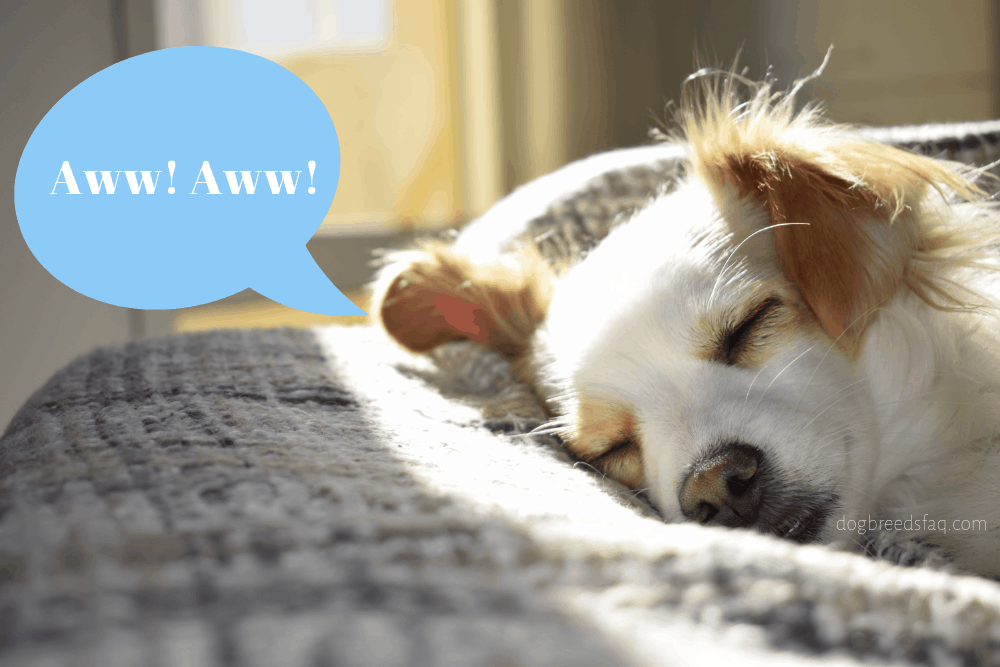Believe it or not, dog barking is one of the most common public nuisance complaints according to most local authorities in urban areas throughout the whole world.
If you are reading this article, you are probably wondering: Why do dogs bark in their sleep?
Dogs bark in their sleep because they are dreaming, suffering from sleep disorders, stress, or anxiety
1. Dreams
This is the most common cause: dogs dream, just like humans. When they do, they usually move their legs, bark, and whimper. It is almost as if they were reenacting some moments in their lives!
Why Does That Happen?

Some experts say that making sounds during sleep is a more common trait in puppies and younger dogs, but sleep sounds have also been observed in all kinds of pets, including older dogs.
Curiously enough, barking isn’t the only sound or behavior some dogs manifest in their sleep routines.
Many dogs are known for whimpering or howling as they dream. They make small sounds you can occasionally hear if you sleep close to your dog.
At times, you might even, so dogs move as they sleep. For example, some dogs seem to be trying to run in their sleep, possibly dreaming about chasing something or being outside playing.
It is also often said that a sleeping position commonly adopted by a dog can reveal so much about its dreams and sleeping patterns.
Sleeping habits can also be seen as a powerful indicator of your dog’s health and mental state (happiness, stress levels, and so on).
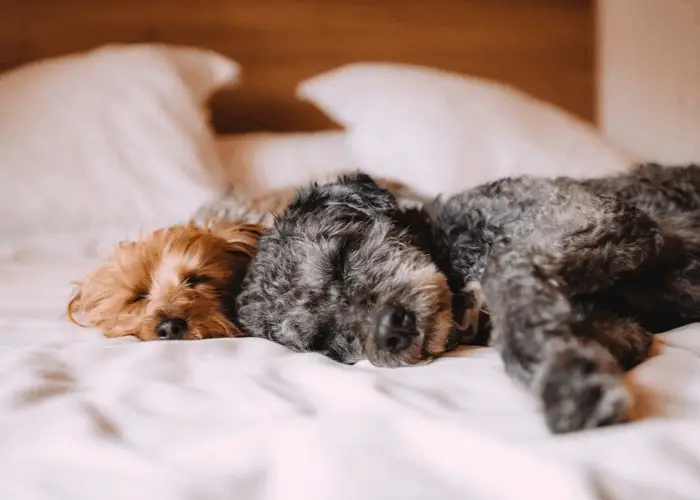
Although there is likely nothing wrong with your dog’s health, the night noises might be a problem for you, your roommates, or your neighbors.
There are a few things that you can do to try and prevent this from happening.
The first thing to do is to make sure that your dog is asleep when it barks at night.
If you find that your dog is awake while barking at night, as opposed to being asleep, there might be many other leading causes for this behavior.
The dog might have difficulty sleeping for whatever reason, so it might bark out of boredom or feeling lonely.
Sometimes, older dogs can simply bark in the middle of the night due to senile dementia.
Due to separation anxiety, dogs bark when they sleep in rooms far away from their owners.
Some dog owners might assume that their dogs are barking while dreaming. In some cases, their canine friends might be barking because they need something, like food or water.
Should I Wake My Dog Up If He Is Having A Dream?
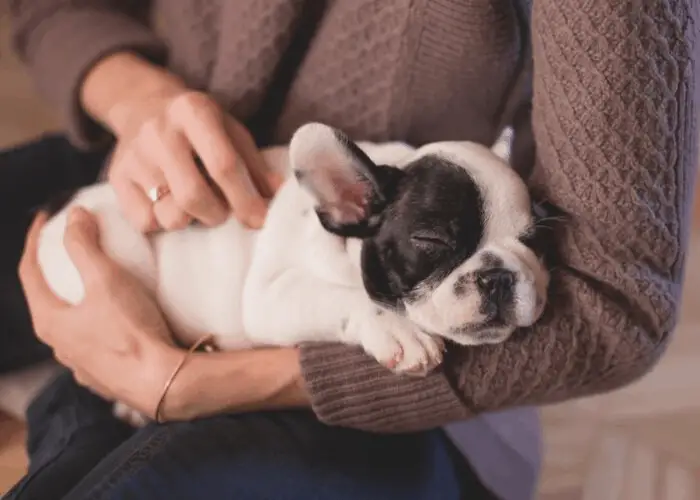
When you notice your dog barking at night, take the time to go check it out. If you find that your dog is actually awake, there is probably a reason why it is barking rather than just dreaming!
If you do come to find that your dog is indeed asleep and into oblivion, try not to wake it up!
Interrupting your dog’s sleep cycle is never a good thing because you can add some stress to its routine.
As you might know, stress and lack of sleep aren’t good for humans, let alone for our four-legged friends!
If the barking or other sounds are mild or maybe only occasional, you might consider just letting them be.
However, if your dog barks loudly and frequently in the middle of the night while it is asleep, you might need to do something about it.
Some experts took the time to study dogs’ sleep duration and behaviors while asleep.

As it turns out, dogs seem to be dreaming very similarly to how we humans do!
When dreaming, a dog is in its deepest stage of being asleep. This is something that also happens to us, and it is commonly referred to as the REM phase.
The aforementioned acronym is short for “rapid eye movement” because we (and our dogs) move our eyes fast when we are asleep so deeply.
One of the main differences between our dreams and our dog’s dreams is the subject of such dreams!
Many dogs might dream about their daily activities, which might explain many common sleep behaviors, such as running motion, whimpering, or barking!
You probably have nothing to worry about, so don’t be too concerned!
2. Sleep Disorders
Some dogs might experience sleep disorders, like narcolepsy. This might lead them to develop unhealthy sleep patterns. In turn, their sleep might be noisier than normal.
3. Stress And Anxiety
Some dogs might have problems with their anxiety and stress levels. If this is the case, they might experience bad dreams or even erratic sleeping patterns. As a result, they might bark or make a lot of noise while they sleep.
RELATED ARTICLE: Why Does My Dog Lay On Top Of Me?
Soundproofing And Room Control
One of the easiest and painless solutions is to let your dog sleep in a room far enough not to bother anyone.
In some cases, getting extra padding around your dog’s sleeping nook might even be possible.
This might improve the dog’s comfort and absorb some extra sound. Soft materials (like blankets or pillows) prevent sound waves from bouncing off walls and other sonically reflective surfaces. It might enhance and amplify the sound your dog makes.
Some people do soundproof their room or at least try their best to minimize the echo in their homes with rugs, extra blankets, tents, foam panels, and insulation.
This could be a great and relatively cost-effective option that might help you solve the problem once and for all without disrupting your beloved pet’s lifestyle and sleep cycle.
Consult Your Vet And Get Some Advice.
 In some extreme cases, your dog’s nightly barking can be so extreme and off-putting that you might want to consult your veterinarian.
In some extreme cases, your dog’s nightly barking can be so extreme and off-putting that you might want to consult your veterinarian.
Most vets will tell you that the barking is usually very normal and that there is probably nothing that you need to be worried about.
Having said that, a visit might help you unearth some issues that you might not have been aware of, possibly causing the noises.
For example, some dogs (especially older dogs) might suffer from night problems such as sleep apnea.
This might prompt them to frequently wake up in distress, bark and make noises before falling asleep again, and do the same thing several times throughout the night.
Some dogs, especially if overweight or obese, might suffer from narcolepsy. It is a nervous system disorder that prompts dogs to fall asleep suddenly, almost collapsing. This might happen after a time of physical activity or an exciting event in the dog’s life.
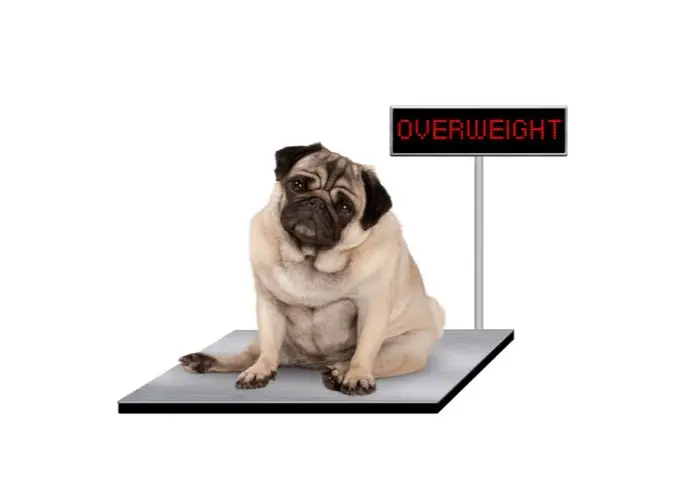
Narcoleptic dogs might tend to have louder sleep patterns, but it varies from case to case.
Dogs might even suffer from insomnia in some cases, but it is usually quite rare, and it is often a sign of other health issues lurking around.
For example, if your dog experiences pain from an injury or if it is bothered by pests like fleas, it will likely not be able to sleep.
Sleep deprivation in dogs can indeed cause a build-up of stress hormones. This might also lead to a weaker immune system, thus making your dog more vulnerable to disease or infection.
These are only a few examples of one of the many problems affecting your dog’s sleep health.
Some dogs might even have a stressed sleep cycle, perhaps getting too much sleep during the day and not enough at night.
If this is the case, it might be a good idea to try and engage your dog more during the day.
Take him out more, play with him, and do more activities. A bored dog tends to sleep more and have a more sedentary lifestyle, which might lead to a less healthy sleep routine.
On the other hand, active dogs who make the most out of their days usually have more regular sleep patterns without too many sound issues!
Conclusions And Final Observations.
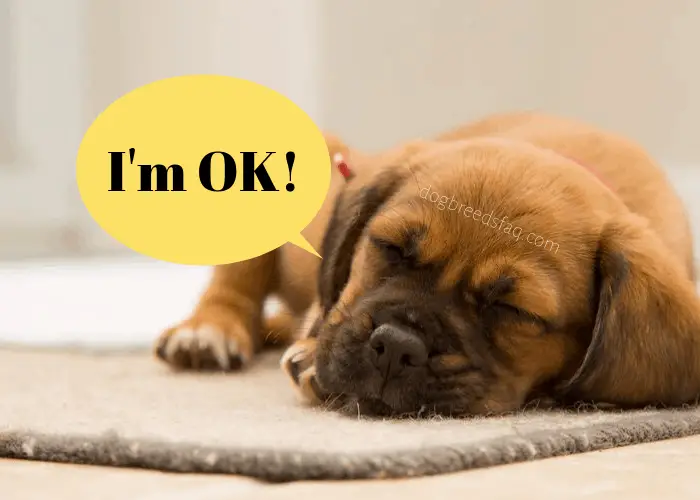
In most cases, you have nothing to worry about if your dog is barking or making other noises in its sleep.
Most likely, it’s all about dreaming, and there is nothing to worry about.
Some dogs may simply be more vocal than others, and they manifest this personality when sound asleep and dreaming.
Some might even be heard howling or seen licking in their sleep, probably reminiscing about a nice meal or thinking about playing with you or other dogs!
Avoid waking your pet in the middle of the night, but try to find some alternative solutions, as described above in this article.
Sleep is vital to the health and wellness of your dog, so you should avoid waking up your pet.
Lack of sleep or frequently interrupted sleep can give your dog a lot of stress, and you might even find that it might negatively impact the pet’s behavior.
Dogs that don’t get enough sleep might tend to act strange, behaving in bizarre, unpredictable ways and even displaying some aggression!

